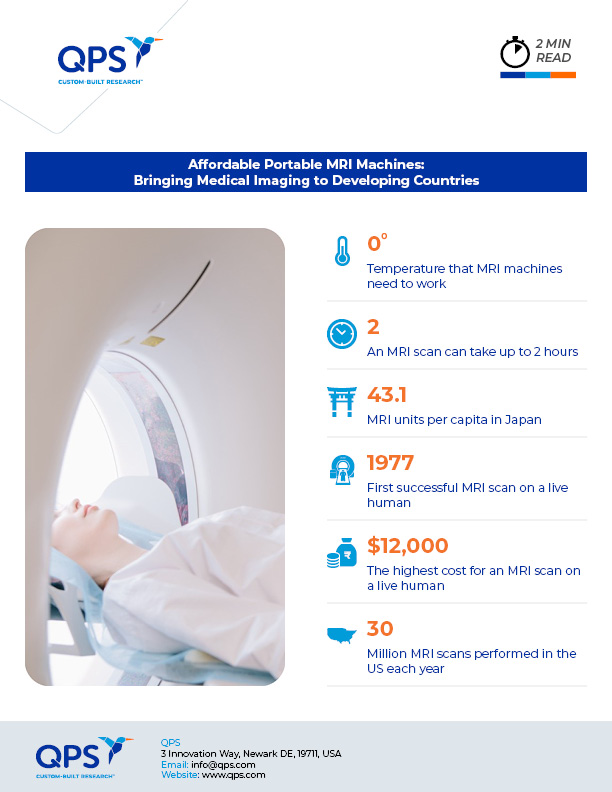Magnetic resonance imaging (MRI) is a valuable medical imaging technique, yet it is often inaccessible in developing countries due to the high cost of the technology. To make this tool more widely available, researchers have been working to develop a smaller, portable alternative. One such machine is the Swoop®, a portable scanner that is much less costly and can be moved into a patient’s hospital room. It received approval from the U.S. Food and Drug Administration in August 2020 for brain imaging of patients of all ages. Since then, it has been approved for commercial sale in Canada, Australia, the European Union, New Zealand, and the United Kingdom.
Made by the company Hyperfine, the Swoop uses smaller magnets, producing fields about 1/25th as strong as fields generated by standard MRI scanners. By leveraging cutting-edge electronics, highly efficient data collection, and innovative signal processing techniques, the smaller magnets can produce a useable image. The image resolution from the portable device is about half that of standard machines. This means that it will not catch everything, which health practitioners must take into consideration.
Less Powerful, More Available
Standard MRI scanners use large, powerful superconducting electromagnets and cost $1.5 million or more. They are cost-prohibitive for much of the world’s population and access can be difficult even in the United States. The Swoop, by contrast, costs about $250,000. Hyperfine has sold more than 100 scanners, with the goal of expanding how MRI is used. “Our portable scanner brings MRI closer to the patient, both in time and in distance,” said Khan Siddiqui, Hyperfine’s chief medical officer and chief strategy officer. It could be used, for example, in the neuro ICU to quickly scan patients who cannot be transported to a conventional MRI or a CT machine.
For a standard MRI, a patient lies on a table that is moved into the large cylindrical magnet. For a Swoop scan, the patient’s arms and legs are free and their head is contained in a close-fitting helmet-like device. With access to a portable scanner, patients could have easier access to follow-up scans, allowing physicians to detect changes sooner than they might otherwise.
Imaging in the Developing World
In places where MRI is currently unavailable, a portable alternative can be game-changing. Researchers in the Netherlands, led by MRI physicist Andrew Webb, designed a portable scanner and plan to make the plans available at no cost so that entrepreneurs in developing countries can build them for local use. As a trial, they sent a scanner kit to Johnes Obungoloch, a biomedical engineer at Mbarara University of Science and Technology in Uganda and traveled there to help the team set it up.
Researchers are hoping to test this scanner and the Swoop as potential alternatives to CT scans for guiding pediatric surgery in Africa. At the CURE Children’s Hospital of Uganda, a small neurosurgical facility in Mbale, 75 percent of patients receive care for hydrocephalus. The condition is marked by the buildup of cerebrospinal fluid in the brain. It can put pressure on the brain and lead to long-term complications. Guided by imaging, surgeons can drain the fluid. MRI would be preferable to CT scans, which expose patients to x-ray radiation.
“If the MRI proves comparable to the CT scan, then there is no reason why we should be using the CT scan anymore,” said Ronald Mulondo, a physician at CURE. If the study receives government approval and shows that the portable scanners are useful, Obungoloch suggests that more could be built and deployed in six other CURE hospitals in Africa.
Novel Uses Could Drive Acceptance
It’s possible that a “use case” for the portable scanner will emerge. If, for example, they can be deployed in ambulances to detect strokes more rapidly, they might win over skeptics. In the meantime, stakeholders are considering the concept of trading image resolution for access. “Is the best technology the scanner that can provide the highest quality images or is it the scanner that can lead to the most improved patient outcomes?” wondered Joshua Harper, a neural engineer at the German Paraguayan University, who has collaborated with Webb and hopes to acquire a Swoop.
Did you enjoy this blog post? Check out our other blog posts as well as related topics on our Webinar page.
QPS is a GLP- and GCP-compliant contract research organization (CRO) delivering the highest grade of discovery, preclinical and clinical drug research development services. Since 1995, it has grown from a tiny bioanalysis shop to a full-service CRO with 1,100+ employees in the U.S., Europe and Asia. Today, QPS offers expanded pharmaceutical contract R&D services with special expertise in neuropharmacology, DMPK, toxicology, bioanalysis, translational medicine and clinical development. An award-winning leader focused on bioanalytics and clinical trials, QPS is known for proven quality standards, technical expertise, a flexible approach to research, client satisfaction and turnkey laboratories and facilities. Through continual enhancements in capacities and resources, QPS stands tall in its commitment to delivering superior quality, skilled performance and trusted service to its valued customers. For more information, visit www.qps.com or email info@qps.com.








